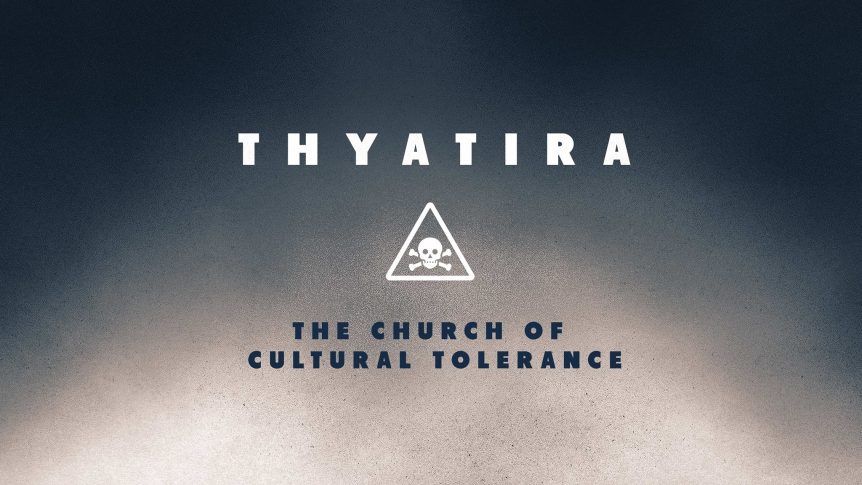Got questions? For sure, especially in light of the letters to Pergamum and Thyatira. So in addition to the the three questions I answered this morning from last week, here are four more from today’s service.
Q: What are the current pagan practices of this culture today?
A: I’d contend these would be on the list: worshiping mother earth/nature, ecumenical gatherings with clearly polytheistic religions, celebrating pluralism and syncretism (multiple gods or combining gods), as well as affirming the denial of absolute truth so that the individual decides his or her own right or wrong. These overarching labels mean things like swinging encounters, one-night stands, prostitution, same-sex marriage ceremonies, and the like are the “down to earth” (no pun intended) ways in which paganism is demonstrated in all of it sinfulness and selfishness.
There is much more that needs to be said about this topic, however, for there are some who feel Christianity has adopted many pagan symbols, holidays, and traditions throughout history, “Christianizing” them along the way. Is this true? What constitutes paganism? Where do we draw the line when it comes to pagan items and ideas from the culture?
The following article— Paganism, Pagans, and Pagan Customs—does a good job providing more insight into this very topic, and I’d encourage you to read it.
Q: What is the difference between managing sin and allowing Christ to kill it? (I know of people who have repented and begged God to take away a temptation but they are continually plagued by it.)
A: It would be helpful to define the phrase “managing sin.” By “managing sin” I am referring to the tendency to make excuses for our sin, allowing it to stay connected to us in detrimental ways. Consider, for instance, a man who struggles with pornography and lust, yet continues to watch shows, movies, or series with “soft porn” because it’s “not as bad as the other stuff.” Or a woman who battles a constant tendency to curse and criticize others, yet still seems fine to complain about everything else but people, assuming “I’m not as bad as I used to be.” This is the essence of managing sin.
Instead, we should realize Christ has freed us from sin by his death and resurrection, and we are now dead to it (Romans 6). Theologically, we don’t have to sin; it no longer owns us. And while perfection will not be attained in this mortal life, we should not settle for a “quota” mentality. No matter what the sin, take Christ at his Word and, in every temptation, strive for victory, not a truce. This is the essence of killing sin.
Allow me a moment to urge you not to see killing sin as a divine removal of temptation. You mentioned you’ve known people for whom God has not “taken away a temptation,” and I’d say that perhaps that is an unrealistic and even unbiblical expectation. In fact, being free from temptation has nothing to do with killing sin and living victoriously. Rather, it’s about being free from sin. Keep in mind there’s no sin in the struggle against sin; temptation in and of itself isn’t a sin. So the fight may be hard, the battle difficult. But since you belong to Christ, not Satan, you don’t have to make allowances for sin or accept some sin in a sort of cease-fire mentality with your spiritual enemy. Not at all! You can live out the truth that you are freed by Christ and found in Christ by refusing to sin, not negotiating with it. This is what I mean by killing it, not managing it.
Q: Does Revelation 2:22 refer to STDs?
A: In my opinion, no. Likewise, I don’t believe Romans 1:27 refers to STD’s either. Some have, over the years, felt these two passages could be a reference to those types of things, but neither text specifically says that’s the intent of the author.
What the “sickbed” in Revelation 2 and the “penalty” in Romans 1 point to and symbolize is God’s judgment. So while I don’t think STD’s were the author’s intent, God may use a disease/sickness of some/any type as a judgment on someone who is unrepentant of their (sexual) sins. This would not be outside of God’s dealings with people, for James indicates some of his recipients were sick because of sin (James 5:14-15), and Paul clearly said that some who partook of communion unworthily were weak, sick, and some even died as a result (1 Cor. 11:30).
Q: Is repentance is response to salvation, or a requirement for it?
A: Both. Let me explain.
When we speak of salvation, we are speaking of a large, supernatural work of God with many components—nine to exact. It begins with election, and ends with glorification. This is what in Latin has been referred to as the Order Salutis—or, in our language, the Order of Salvation. (Click here to learn more about this topic through an InfoGraphic by one of my favorite bloggers, Tim Challies.) Understanding how repentance can be both means investigating some of the specific parts.
Because it is God who grants repentance subsequent to or simultaneous with his Spirit’s convicting work, one could say it is our response, one graciously granted by God before he regenerates us. Without a doubt it is how we respond to the bad news—the truth that we are in sin and at war with God, in desperate need of a Savior.
Yet, this repentance is required, as without it we would never turn from the bad news to the good news—that Jesus Christ is the Savior of the world. Without “confessing with your mouth ‘Jesus is Lord,’ and believing in your heart that God has raised him from the dead,” (Romans 10:9-10), we would never be saved. This is the change that is required, while at the same time the response we give.

